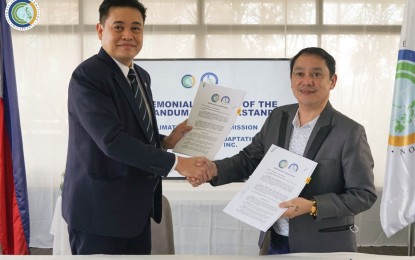
CLIMATE RESILIENCE. Climate Change Commission (CCC) Vice Chairperson and Executive Director Robert Borje and Local Climate Change Adaptation for Development, Inc. (LCCAD) Executive Director Manuel “Nong” Rangas sign a memorandum of understanding (MOU) in this undated photo. The MOU aims to enhance the capacity of local government units in formulating and updating Local Climate Change Action Plans. (Photo courtesy of CCC)
MANILA – The Climate Change Commission (CCC) and Local Climate Change Adaptation for Development, Inc. (LCCAD) have agreed to boost their partnership to enhance the capacity of local government units (LGUs) in formulating and updating Local Climate Change Action Plans (LCCAPs).
In a news release on Thursday, the CCC announced that its Vice Chairperson and Executive Director Robert Borje and LCCAD Executive Director Manuel Rangasa signed a memorandum of understanding (MOU) that aims to upgrade LGUs' capacity in drafting climate resilience plans.
“The MOU enables the CCC and LCCAD to work together in enhancing LGUs’ LCCAPs and integrating these into other local plans, such as the Comprehensive Land Use Plan, the Comprehensive Development Plan and Contingency Plans,” the CCC said.
Among the key outcomes of the partnership are the recommendation of appropriate climate and disaster database development and modeling technology to support the LCCAPs, and establish enabling mechanisms for LGUs to implement their climate change adaptation and mitigation initiatives.
Borje said the MOU was necessary to further build the capacities of LGUs as “front-liners of climate action.”
“Transformative climate action can be achieved through partnerships – partnerships based on principles of cooperation, good governance, and shared advocacy in building the nation’s overall climate resilience,” Borje said.
Rangasa, meanwhile, said enhancing the capacities of key players, including agencies, LGUs, and other stakeholders, would allow the LCCAD to develop and share best practices between regions, particularly communities with common vulnerabilities.
Likewise, CCC Commissioner Albert dela Cruz Sr. assured that the CCC would constantly support the LGUs in the formulation, planning, and implementation of climate change action plans in their respective areas by collaborating with key stakeholders and launching capacity-building activities.
"The key to a climate-resilient Filipino nation is to strengthen the cooperation between and among our stakeholders, including the LCCAD, on mainstreaming climate change adaptation and mitigation in local development and investment planning across the country,” dela Cruz said.
Data from the CCC showed that LCCAP submissions increased by 95 percent from 715 submissions in 2021 to 1,397 as of Dec. 31 last year.
The CCC’s target is to have 100 percent compliance from 1,715 LGUs by Fiscal Year 2024.
The LCCAP, which serves as the LGU’s plan for enhancing local climate resilience, includes information on fit-for-purpose climate actions anchored on the LGU’s site-specific risks and vulnerabilities.
The CCC is the lead policy-making body of the government tasked to coordinate, monitor, and evaluate government programs and ensure mainstreaming of climate change in national, local, and sectoral development plans toward a climate-resilient and climate-smart Philippines. (PNA)
